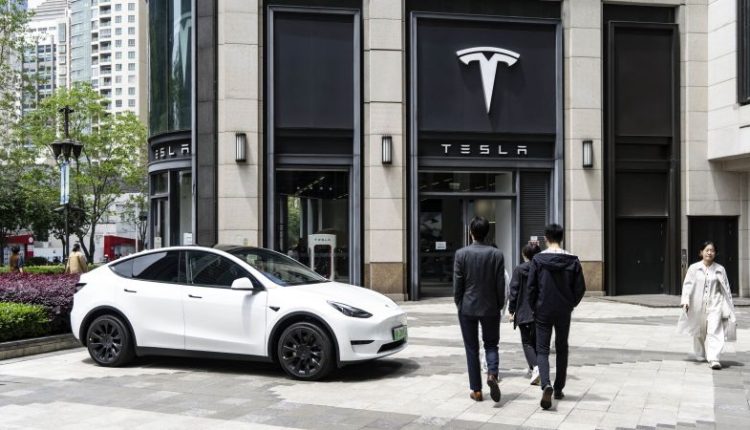Editor’s Note: Sign up for CNN’s Meanwhile in China newsletter which explores what you need to know about the country’s rise and how it impacts the world.
Tesla is one step closer to launching full-self driving (FSD) technology in China after it clinched an agreement with Baidu to upgrade its mapping software.
The Chinese tech giant said Saturday that it was providing lane-level navigation services for Tesla cars. Baidu (BIDU) says this level of navigation can provide drivers with detailed information, including making lane recommendations ahead of upcoming turns, to enhance safety.
Experts said during Tesla (TSLA) CEO Elon Musk’s surprise visit to China at the end of April that one of his main hurdles in securing government approval to rollout the company’s FSD software was reaching a mapping and navigation deal with Baidu.
“With the support of Baidu’s lane-level map, Tesla’s navigation can accurately render lane changes on the road the user is currently on, upgrading from providing road-level guidance to providing lane-level guidance,” Baidu said in the statement.
China’s answer to Google has been been providing mapping services to Tesla since 2020. But prior to Saturday’s announcement, its services had been limited to “road-level” information, which is less precise than lane-level navigation.
A day earlier, Tesla launched its new software upgrade for users in urban areas in China, the world’s biggest car market, saying in a statement on WeChat that such detailed road information was being made available “for the first time.”
CNN has reached out to Tesla for comment. On Monday, Baidu declined further comment.
Virtually all Teslas have a driver-assistance system called Autopilot, while the more robust FSD feature comes at a premium price. Autopilot is available in China, but not the full FSD feature.
Teaming up with Baidu would remove an obstacle, as the Chinese firm has key mapping credentials that can be applied to driver-assistance functions.
According to Chinese regulations, all self-driving systems must obtain mapping qualifications before operating on public roads. Foreign car companies need to partner with licensed Chinese companies to qualify for surveying and mapping.
Partnering with Baidu would allow Tesla to run its full self-driving system on China’s public roads, with its vehicles able to collect surrounding data, such as road layout, traffic signs and buildings.
It could also accelerate Tesla’s global development of its self-driving technology, as data from China could be used to train Tesla’s algorithms needed for fully autonomous vehicles.
Car owners have long complained on social media about Tesla’s previous navigation services, which were also provided by Baidu, saying they often have to rely on other maps available on smartphones while driving.
Elon Musk makes surprise visit to China, meets senior trade officials
“This time, you can really remove your mobile phone holders (mounted in the car),” Tesla said in its Friday announcement, suggesting drivers no longer need other maps for navigation.
The news went viral on Chinese social media on Monday.
“After the system upgrade, I no longer need to use my mobile phone to navigate,” said one Weibo user. “Tesla’s (own) navigation system can finally be used.”
Introducing the FSD system could provide a revenue boost to Tesla, which is having a tough time in China. In April, it slashed prices across its car product lines in the country, hoping to bolster sales in the face of slowing demand and increased competition.
Read the full article here

